
Find Help
More Items From Ergsy search
-
Can people of any blood type receive a transfusion of any blood type?
Relevance: 100%
-
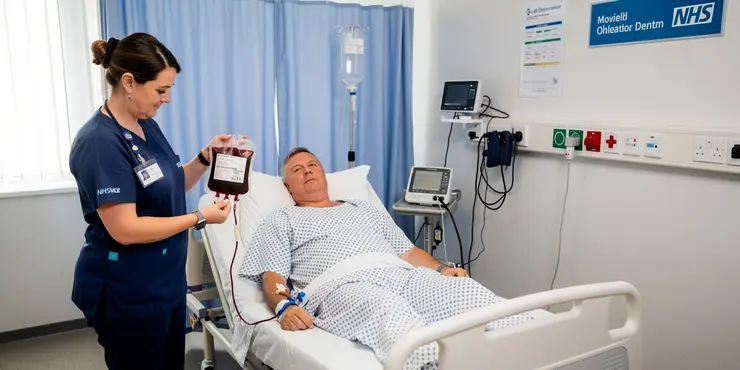
What types of blood products can be transfused?
Relevance: 97%
-
What is a blood transfusion?
Relevance: 94%
-
Blood Product Transfusions
Relevance: 92%
-
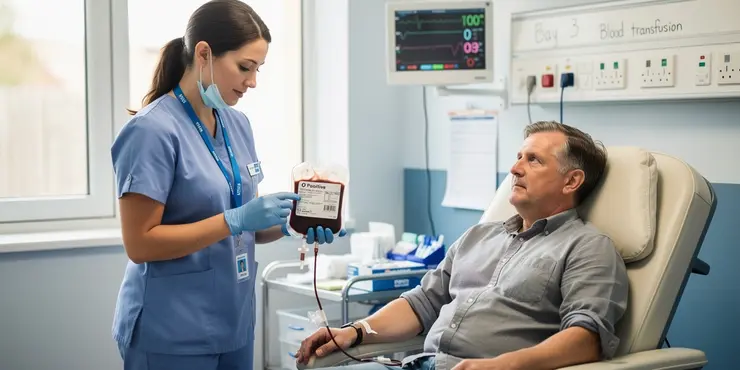
Blood Transfusion
Relevance: 91%
-

Are there risks associated with blood transfusions?
Relevance: 85%
-

Is HTLV a risk in blood transfusions?
Relevance: 84%
-
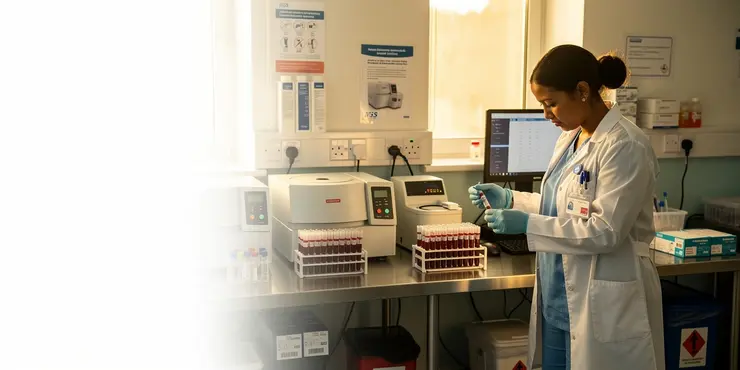
How do healthcare providers match blood for transfusions?
Relevance: 82%
-
Is there an age limit for receiving blood transfusions?
Relevance: 82%
-
Can someone have a reaction to a mismatched blood transfusion?
Relevance: 81%
-
How long does a blood transfusion take?
Relevance: 80%
-
What are some common reasons blood transfusions are needed?
Relevance: 80%
-

Is Hepatitis B a risk in blood transfusions?
Relevance: 79%
-
Why might someone need a blood transfusion?
Relevance: 77%
-

What diseases can be spread by blood transfusions?
Relevance: 76%
-
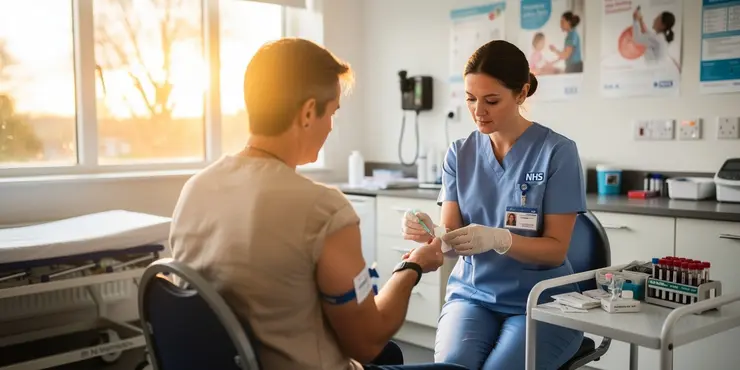
Is Chagas disease a concern with blood transfusions?
Relevance: 75%
-
Can HIV be transmitted through blood transfusions?
Relevance: 75%
-

How do doctors determine how much blood is needed for a transfusion?
Relevance: 74%
-

Can syphilis be transmitted via blood transfusion?
Relevance: 74%
-
Can bacterial infections be transmitted through blood transfusion?
Relevance: 74%
-
Is Zika virus screened for in blood transfusions?
Relevance: 74%
-
Can certain medical conditions prevent receiving blood transfusions?
Relevance: 73%
-
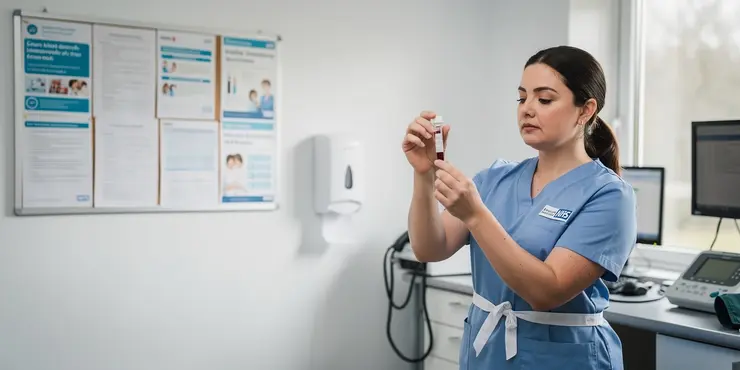
What is the most common disease transmitted by blood transfusion?
Relevance: 73%
-
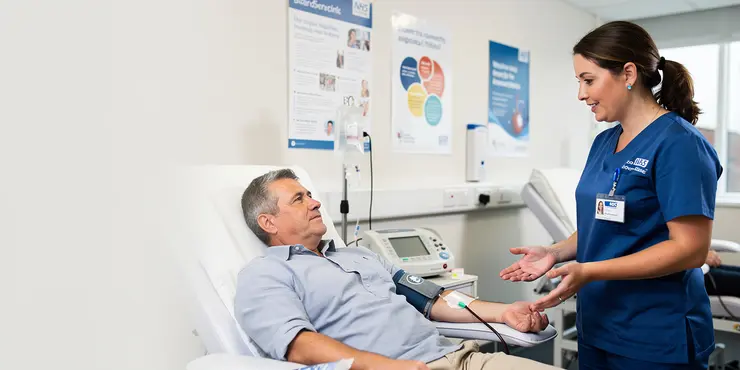
Are there any parasites that can be transmitted through blood transfusions?
Relevance: 73%
-
Is malaria still a concern for blood transfusion safety?
Relevance: 73%
-
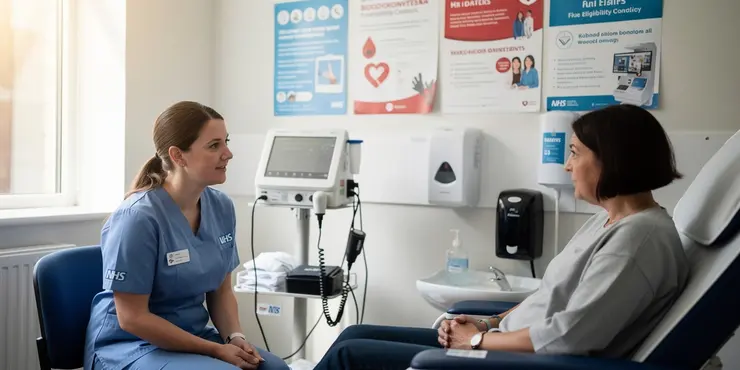
Can COVID-19 be transmitted through blood transfusions?
Relevance: 72%
-
Can Dengue fever be transmitted through blood transfusions?
Relevance: 72%
-
Can you get any prion diseases from blood transfusion?
Relevance: 67%
-
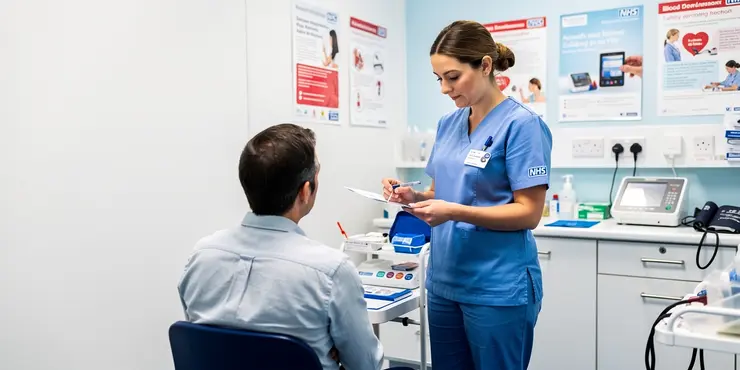
What measures are taken to prevent disease transmission in blood transfusions?
Relevance: 65%
-
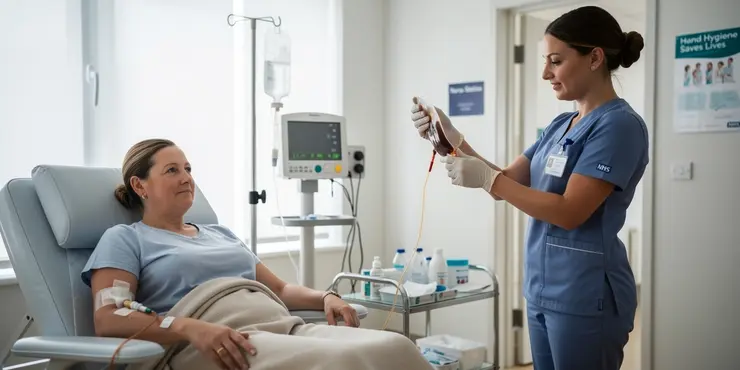
What is plasma, and why might it be transfused?
Relevance: 65%
-
Is blood used for transfusions safe?
Relevance: 65%
-
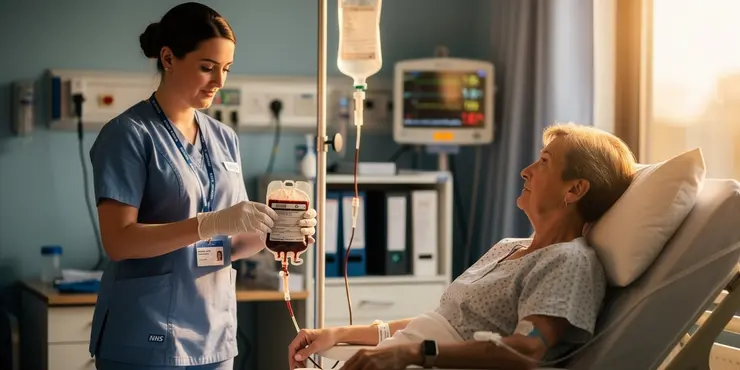
Can cytomegalovirus (CMV) be spread through transfusions?
Relevance: 61%
-
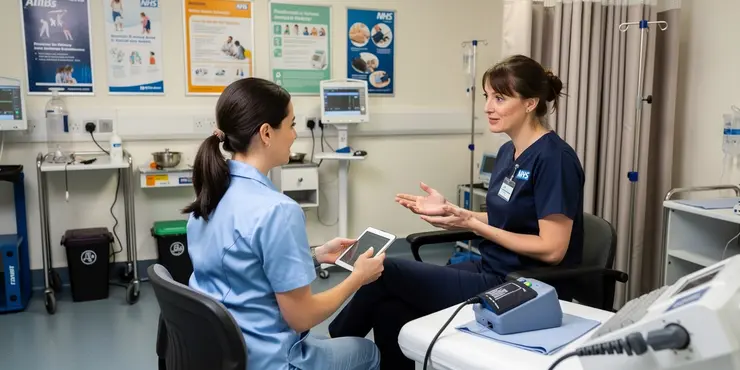
Are there global differences in screening for blood transfusions?
Relevance: 57%
-

How is blood screened to prevent disease transmission?
Relevance: 55%
-

Does the mother’s blood type affect jaundice in the newborn?
Relevance: 54%
-
What should a patient expect after a blood transfusion?
Relevance: 52%
-
What kind of follow-up care is needed after a blood transfusion?
Relevance: 51%
-
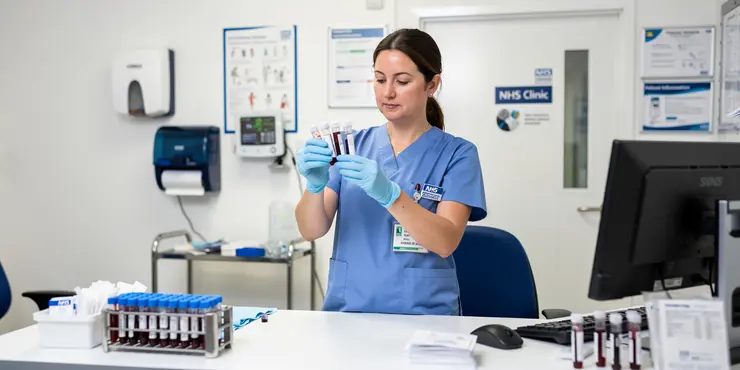
What other viruses are tested for in blood donations?
Relevance: 46%
-
Are new emerging pathogens a risk for blood safety?
Relevance: 46%
-

How is a blood transfusion performed?
Relevance: 42%
Understanding Blood Types
In the UK, as elsewhere, blood transfusions are a vital part of medical care. The success of transfusions largely depends on matching compatible blood types between donor and recipient. Human blood is categorized into different groups based on the presence or absence of certain antigens on the surface of red blood cells. These antigens determine a person’s blood type and compatibility for transfusions.
The ABO Blood Group System
The most important blood group system for transfusions is the ABO blood group system, which classifies blood into four main types: A, B, AB, and O. Each of these types can be further categorized by the presence or absence of the Rh (Rhesus) factor, which can be positive (+) or negative (-). This results in eight possible blood type combinations: A+, A-, B+, B-, AB+, AB-, O+, and O-.
Compatibility and Transfusion
In blood transfusion, compatibility between the donor's and recipient's blood types is crucial to prevent adverse reactions. The general rules are as follows:
- Type O- is considered the universal donor for red blood cell transfusions, as it does not have A, B, or Rh antigens and can be given to people of any blood type.
- Type AB+ is considered the universal recipient, meaning individuals with this blood type can receive red blood cells from any other blood type.
- Individuals with type A can receive A or O blood, while those with type B can receive B or O blood.
- Individuals with type AB can receive A, B, AB, or O blood, but the Rh factor must still be considered.
- Those with type O can only receive O blood.
Rhesus Factor
The Rh factor adds another layer of compatibility consideration. Rh-positive blood can be given to Rh-positive recipients, whereas Rh-negative blood is preferred for Rh-negative recipients. Giving Rh-positive blood to an Rh-negative person can lead to a serious reaction, so care is taken to match the Rh factor whenever possible.
The Role of Blood Type in Emergencies
In emergency situations where there is no time to determine a recipient’s blood type, O- blood is often used due to its universal donor status. This practice ensures that patients receive a life-saving blood transfusion without the risk of an immediate adverse reaction.
Conclusion
While advances in medicine continue, understanding and matching blood types remains crucial for the success of blood transfusions. The ABO and Rh systems play a key role in ensuring the safety and effectiveness of these procedures, guiding healthcare professionals in providing optimal care to patients in the UK and around the world.
Understanding Blood Types
In the UK, blood transfusions help people who are sick or hurt. To do this safely, doctors must match the correct blood types from the donor to the patient. Blood has different groups because of special markers called antigens. These antigens decide a person’s blood type and what blood they can receive.
The ABO Blood Group System
The main blood group system is called ABO. It splits blood into four types: A, B, AB, and O. Each type can be positive (+) or negative (-) because of something called the Rh factor. So, there are eight blood types: A+, A-, B+, B-, AB+, AB-, O+, and O-.
Compatibility and Transfusion
When giving blood, it is important that the donor and the patient have matching blood types. Here are the main rules:
- Type O- can give blood to anyone. It is called the universal donor.
- Type AB+ can receive blood from anyone. It is called the universal recipient.
- People with type A can get A or O blood.
- People with type B can get B or O blood.
- People with type AB can get A, B, AB, or O blood, but the Rh factor is also important.
- People with type O can only get O blood.
Rhesus Factor
The Rh factor is also important. People with Rh-positive (+) blood can get blood from Rh-positive donors. People with Rh-negative (-) blood should get blood from Rh-negative donors. Giving Rh-positive blood to an Rh-negative person can be dangerous. So, doctors are careful to match the Rh factor.
The Role of Blood Type in Emergencies
If there is an emergency and there is no time to find out the patient’s blood type, doctors use O- blood. It is safe to use because it is the universal donor and won't cause a bad reaction.
Conclusion
Understanding blood types is very important for safe blood transfusions. The ABO and Rh systems help doctors give the right blood and keep patients safe. They guide doctors to give the best care in the UK and everywhere.
Frequently Asked Questions
Can people of any blood type receive a transfusion of any blood type?
No, people cannot receive blood from just any blood type. Compatibility depends on both the ABO and Rh blood group systems.
What determines blood type compatibility for transfusions?
Compatibility is determined by the presence of specific antigens on red blood cells (ABO and Rh systems) and antibodies in plasma.
Which blood type is known as the universal donor?
O negative blood type is known as the universal donor because it can be given to patients of any ABO and Rh blood type.
Which blood type is known as the universal recipient?
AB positive is known as the universal recipient because individuals with this blood type can receive red blood cells from any ABO and Rh group.
Why can't a person with type A blood receive type B blood?
Type A blood has anti-B antibodies that will attack and destroy type B red blood cells, causing a transfusion reaction.
What happens if a person receives incompatible blood type?
Receiving incompatible blood can cause a serious and potentially life-threatening immune response known as a transfusion reaction.
Can a person with type O blood receive blood from any type?
No, individuals with type O blood can only receive blood from other type O donors due to their anti-A and anti-B antibodies.
Why is the Rh factor important in blood transfusions?
The Rh factor is critical because individuals who are Rh-negative can have an immune response if they receive Rh-positive blood.
What blood types can an AB negative person receive?
An AB negative person can receive blood from AB negative, A negative, B negative, and O negative donors.
What blood types can A positive individuals receive?
A positive individuals can receive A positive, A negative, O positive, and O negative blood.
Is it safe for B negative individuals to receive B positive blood?
No, B negative individuals should not receive B positive blood due to the risk of developing antibodies against the Rh factor.
Can AB positive individuals donate to anyone?
AB positive individuals cannot donate to just anyone; they can only donate plasma to anyone, but for red blood cells, compatibility depends on the recipient's blood type.
What is the most common blood type?
The most common blood type varies by population, but globally, O positive is the most prevalent.
Why is O negative blood frequently used in emergencies?
O negative blood is frequently used in emergencies because it can be safely given to patients of any blood type when there's no time for blood type testing.
Can a person with AB negative blood type donate to those with B positive blood type?
No, AB negative can only donate red cells to AB negative or AB positive recipients.
Are there any risks associated with blood transfusions?
While generally safe, blood transfusions carry risks such as allergic reactions, transfusion reactions, and infection.
How does blood typing work?
Blood typing involves determining the ABO group and the Rh factor by testing for the presence of specific antigens on red blood cells.
What precautions are taken to ensure safe transfusions?
Precautions include blood typing and crossmatching donor and recipient blood to ensure compatibility.
Can a Rh-negative mother have a Rh-positive baby?
Yes, if the father is Rh-positive, the baby can be Rh-positive, which might necessitate medical interventions to avoid complications.
What is crossmatching in blood transfusion?
Crossmatching is a test to ensure donor blood is compatible with recipient blood before a transfusion.
Can anyone get blood from any blood type?
No, people cannot get blood from any blood type. Here's why:
- People have different types of blood, like A, B, AB, and O.
- Doctors need to match the blood type for safe transfusions.
If you need help understanding, you can:
- Ask a doctor or nurse to explain.
- Use pictures to see how blood types match.
No, people can't get blood from just any blood type. The right match depends on two things: ABO and Rh blood groups.
What makes blood types safe for giving and receiving blood?
When doctors give someone new blood, they need to make sure the blood types match. This is to keep the person safe. Blood types must be right for them to mix.
Here are some things to remember about blood types:
- Blood types are like different groups. The main groups are A, B, AB, and O.
- Each group can also be positive (+) or negative (-).
- Doctors match the blood types so they fit together well.
If the blood types don’t match, it can make someone sick. That's why matching blood types is very important.
Thinking tools can help. Using pictures or color codes can show blood type groups easily. Talking to someone about it can also help understand better.
Blood compatibility is about matching the right parts in blood. These parts are called antigens and antibodies.
Antigens are like different badges on red blood cells. There are two main badges called ABO and Rh.
In the liquid part of blood, called plasma, there are things called antibodies. They need to match with the right antigens.
To understand more, you can ask a doctor or use tools like pictures and videos about blood matching.
What blood type can give to everyone?
O negative blood is special. It is called the universal donor. This means anyone can receive O negative blood, no matter their blood type.
What blood type can take any other blood type?
Some people have a special blood type that can get blood from anyone. Which one is it?
Tip: If reading is hard, you can ask someone to read it to you or use a computer app that reads it aloud.
People with AB positive blood can get red blood cells from anyone. We call this blood type the "universal receiver." This means AB positive can get blood from any type.
Why can't someone with type A blood get type B blood?
People have different kinds of blood. These are called blood types. One type is type A, another is type B.
If you have type A blood, your body does not like type B blood. Your body will think the type B blood is bad. It will try to fight it, like fighting germs.
This can make you very sick. So, people with type A blood should only get type A blood.
To help understand better, you can use pictures or models of blood cells.
Ask a doctor or nurse if you have more questions.
People with Type A blood have special fighters called anti-B antibodies. These fighters do not like Type B blood. If someone with Type A blood gets Type B blood, the fighters will attack and destroy the Type B blood cells. This can make the person sick.
What happens if a person gets the wrong blood type?
If someone gets the wrong kind of blood, it can make them very sick. This is called a "blood type mismatch."
Here is what might happen:
- They might feel hot and get a fever.
- Their body might hurt or they might feel weak.
- They could feel like they need to throw up.
Getting the right blood type is very important. Doctors must be very careful to match blood types correctly.
If you want to understand more or need help with reading, you can:
- Ask a friend or family member to explain it.
- Use apps that read text out loud for you.
- Look at pictures or videos about blood types for better understanding.
Getting the wrong type of blood can make your body very sick. This is because your body tries to fight against the blood, which can be very dangerous.
Can someone with type O blood get blood from any type?
People with type O blood can only get blood from other type O people. It is best for them to have blood from the same type. If you find this hard to remember, you can ask someone to help you or use a chart or picture to see which blood types match.
No, if you have type O blood, you can only get blood from someone else with type O blood. This is because your blood has something called anti-A and anti-B antibodies.
Why is the Rh factor important when giving blood?
The Rh factor is a part of your blood. It can be positive (+) or negative (-).
When you get blood from someone else, the Rh factor needs to match.
If it doesn't match, it can make you feel very sick.
Matching Rh helps keep you safe and healthy.
If you find reading hard, you can:
- Ask someone to read with you.
- Use tools that read out loud.
The Rh factor is important. If someone does not have the Rh factor (Rh-negative) and they get blood with the Rh factor (Rh-positive), their body might fight it like it's something bad.
What blood can someone with AB negative get?
If you have AB negative blood, you can get blood from:
- AB negative
- A negative
- B negative
- O negative
When you need help understanding, you can:
- Ask a friend or family member to explain.
- Use pictures or diagrams to see it better.
- Listen to audio or watch videos on the topic.
A person with AB negative blood can get blood from these types: AB negative, A negative, B negative, and O negative.
What blood types can people with A positive blood get?
If you have A positive blood, you can get blood from:
- A positive
- A negative
- O positive
- O negative
These are the blood types you can safely receive.
To make reading easier, you can use:
- Text-to-speech tools to listen to the words.
- Highlighting tools to focus on one line at a time.
If your blood type is A positive, you can get blood from A positive, A negative, O positive, and O negative.
Can someone with B negative blood get B positive blood safely?
No, people with B negative blood should not get B positive blood. This is because it can make their body create bad things called antibodies against the Rh factor.
Can people with AB positive blood give blood to everyone?
If you have AB positive blood, you are a "universal receiver." This means you can receive blood from any blood type. But, you can only give blood to other AB positive people.
If you are giving blood, it's important to know your blood type. You can ask a doctor to help you find out your blood type.
A blood donation center is a place where you can give blood. There are people there who can answer your questions and help you. If you want to donate blood, you can use helpful tools like picture charts or ask for help if you need it.
People with AB positive blood cannot give blood to everyone. They can give plasma to anyone. But for red blood cells, the person getting the blood must have a matching blood type.
What is the most common blood type?
Blood types are like different groups that tell us about our blood.
The most common blood type is called O Positive (O+).
To make understanding easier:
- Use pictures or charts showing blood types.
- Ask an adult or teacher to help explain if you are unsure.
Blood types are like different groups of blood that people have. The most common blood type in the world is O positive. This means most people have O positive blood.
Why is O negative blood used a lot in emergencies?
O negative blood can be given to anyone. This makes it very helpful in emergencies when there is no time to test a person's blood type.
- Use a finger to track each word.
- Read out loud with someone.
- Break sentences into small parts.
- Use a colored overlay if helpful.
O negative blood is important in emergencies because it is safe for everyone. It can be given to anyone when there is no time to check their blood type.
Can someone with AB negative blood give blood to someone with B positive blood?
If you have AB negative blood, you cannot give blood to someone with B positive blood. They have different blood types.
It is important to match blood types correctly when donating blood. This helps to keep people safe and healthy.
Tools like charts or apps can help you learn which blood types match. Talking to a doctor or nurse is also a good idea.
No, AB negative blood can only be given to people with AB negative or AB positive blood.
Is getting a blood transfusion risky?
Getting blood from another person is usually safe. But sometimes, things can go wrong.
Here are some things that might happen:
- You might feel sick or get a fever.
- You could have a reaction, like your body not liking the new blood.
- There is a very tiny chance of getting an infection. This is very rare.
If you have questions or feel worried, tell your doctor or nurse. They can help explain and make you feel better.
Tools like pictures or simple charts can help you understand better.
Blood transfusions are usually safe, but sometimes things can go wrong. People might have an allergic reaction, a bad reaction to the new blood, or get an infection.
How does blood typing work?
Blood typing is a way to find out what kind of blood you have. There are four main kinds: A, B, AB, and O. Knowing your blood type is important for things like getting the right blood in a transfusion.
To find out your blood type, doctors do a simple test. They take a small bit of your blood and mix it with special liquids. These liquids help show which blood type you are.
Use pictures or videos to help understand better. Ask a teacher or parent for help, too!
Blood typing is a way to find out what kind of blood you have. We look for special markers on your red blood cells called antigens. These help us know your ABO group and if you have a Rh factor.
To help understand better, you can use pictures or videos about blood types.
How do we make sure blood transfusions are safe?
- **Testing the Blood:** We check all the blood to make sure it is healthy. - **Matching Blood Types:** We match the blood type of the person giving blood with the person getting blood. - **Careful Checks:** Nurses and doctors double-check everything before giving the blood. If you find reading hard, ask someone you trust to help. You can also use tools like audiobooks or text-to-speech apps.Before you get blood, doctors need to make sure it's safe for you. They check if the blood from the person giving it is the same type as yours. This helps prevent problems.
Can a mom with Rh-negative blood have a baby with Rh-positive blood?
Yes, this can happen. A mom with Rh-negative blood can have a baby with Rh-positive blood. Here is how it works:
1. **Blood Types**: People have different types of blood. Rh-negative and Rh-positive are two kinds. It's like having different hair colors.
2. **Parents and Baby**: The baby's blood type comes from both parents. If a dad has Rh-positive blood, the baby might also have Rh-positive blood.
3. **Doctor Help**: If a mom is Rh-negative and the baby is Rh-positive, doctors can give special medicine to help both mom and baby stay healthy.
**Tools to Help**: Picture charts and flashcards can make it easier to understand blood types. Talking to a doctor or nurse can also help.
Yes, if the dad is Rh-positive, the baby can also be Rh-positive. This might mean doctors need to help to make sure the baby stays healthy.
What is crossmatching in blood transfusion?
Crossmatching is a test. It checks if a person's blood matches the donor's blood. This is important before a blood transfusion. It makes sure the blood is safe to use.
If you find reading hard, try using:
- A dictionary to look up words.
- An app that reads text out loud.
- Talking to someone who can explain it to you.
Crossmatching is a test. It makes sure the donor's blood is a good match for the recipient's blood before a transfusion.
Useful Links
This website offers general information and is not a substitute for professional advice.
Always seek guidance from qualified professionals.
If you have any medical concerns or need urgent help, contact a healthcare professional or emergency services immediately.
Some of this content was generated with AI assistance. We’ve done our best to keep it accurate, helpful, and human-friendly.
- Ergsy carfully checks the information in the videos we provide here.
- Videos shown by Youtube after a video has completed, have NOT been reviewed by ERGSY.
- To view, click the arrow in centre of video.
- Most of the videos you find here will have subtitles and/or closed captions available.
- You may need to turn these on, and choose your preferred language.
- Go to the video you'd like to watch.
- If closed captions (CC) are available, settings will be visible on the bottom right of the video player.
- To turn on Captions, click settings .
- To turn off Captions, click settings again.
More Items From Ergsy search
-
Can people of any blood type receive a transfusion of any blood type?
Relevance: 100%
-

What types of blood products can be transfused?
Relevance: 97%
-
What is a blood transfusion?
Relevance: 94%
-
Blood Product Transfusions
Relevance: 92%
-

Blood Transfusion
Relevance: 91%
-

Are there risks associated with blood transfusions?
Relevance: 85%
-

Is HTLV a risk in blood transfusions?
Relevance: 84%
-

How do healthcare providers match blood for transfusions?
Relevance: 82%
-
Is there an age limit for receiving blood transfusions?
Relevance: 82%
-
Can someone have a reaction to a mismatched blood transfusion?
Relevance: 81%
-
How long does a blood transfusion take?
Relevance: 80%
-
What are some common reasons blood transfusions are needed?
Relevance: 80%
-

Is Hepatitis B a risk in blood transfusions?
Relevance: 79%
-
Why might someone need a blood transfusion?
Relevance: 77%
-

What diseases can be spread by blood transfusions?
Relevance: 76%
-

Is Chagas disease a concern with blood transfusions?
Relevance: 75%
-
Can HIV be transmitted through blood transfusions?
Relevance: 75%
-

How do doctors determine how much blood is needed for a transfusion?
Relevance: 74%
-

Can syphilis be transmitted via blood transfusion?
Relevance: 74%
-
Can bacterial infections be transmitted through blood transfusion?
Relevance: 74%
-
Is Zika virus screened for in blood transfusions?
Relevance: 74%
-
Can certain medical conditions prevent receiving blood transfusions?
Relevance: 73%
-

What is the most common disease transmitted by blood transfusion?
Relevance: 73%
-

Are there any parasites that can be transmitted through blood transfusions?
Relevance: 73%
-
Is malaria still a concern for blood transfusion safety?
Relevance: 73%
-

Can COVID-19 be transmitted through blood transfusions?
Relevance: 72%
-
Can Dengue fever be transmitted through blood transfusions?
Relevance: 72%
-
Can you get any prion diseases from blood transfusion?
Relevance: 67%
-

What measures are taken to prevent disease transmission in blood transfusions?
Relevance: 65%
-

What is plasma, and why might it be transfused?
Relevance: 65%
-
Is blood used for transfusions safe?
Relevance: 65%
-

Can cytomegalovirus (CMV) be spread through transfusions?
Relevance: 61%
-

Are there global differences in screening for blood transfusions?
Relevance: 57%
-

How is blood screened to prevent disease transmission?
Relevance: 55%
-

Does the mother’s blood type affect jaundice in the newborn?
Relevance: 54%
-
What should a patient expect after a blood transfusion?
Relevance: 52%
-
What kind of follow-up care is needed after a blood transfusion?
Relevance: 51%
-

What other viruses are tested for in blood donations?
Relevance: 46%
-
Are new emerging pathogens a risk for blood safety?
Relevance: 46%
-

How is a blood transfusion performed?
Relevance: 42%


